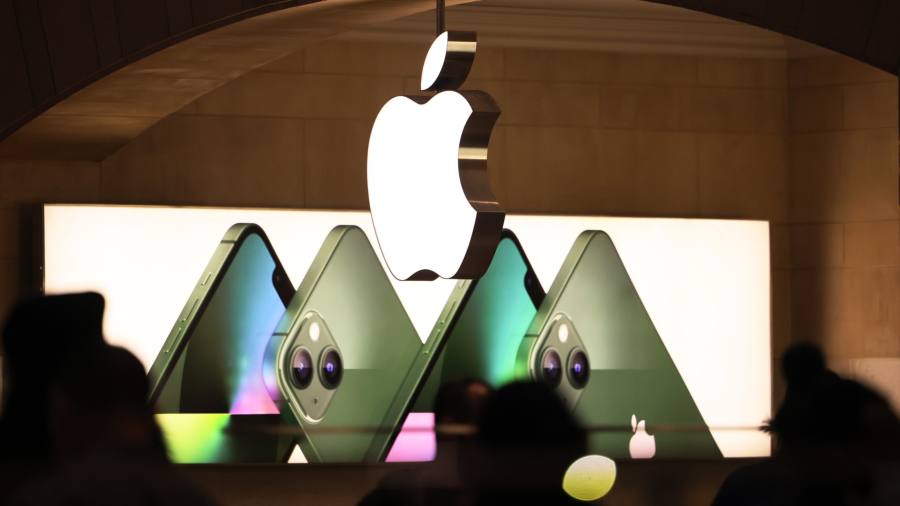Virtual reality start-ups have pinned their hopes on Apple’s longed-for release of a mixed reality headset becoming a catalyst for a rebound in industry funding.
Anticipation is growing that the iPhone maker will host at its annual developer conference on Monday its biggest hardware launch since the iPad in 2010. The headset, with a likely price tag of about $3,000, is expected to combine augmented reality, which conjures up digital images into the real world, and virtual reality, which immerses users into a game-like realm.
“Code new worlds,” reads Apple’s website for Monday’s event, which many interpret as a reference to a new computing platform.
Tipatat Chennavasin, co-founder of the Venture Reality Fund, said he expected the Apple headset to include a new App Store — “the next ecosystem where millions of developers are making millions of dollars selling to billions of people”.
He added that start-ups had for years been showing potential investors “hockey-stick” charts to predict rapid revenue growth once Apple validates the technology with its own hardware.
“I’ve been seeing people promise the Apple device in their pitch decks for like six years,” said Chennavasin, whose fund has backed 50 companies in the industry since 2016. Now that the promised headset launch is likely to be days away, sentiment has reached “fever pitch”, he said.
Hype that AR/VR technology spells the “next big thing” in the industry has over the past six months been deflated by the release of artificial intelligence tools led by ChatGPT, the OpenAI-backed chatbot that provides humanlike answers to queries.
The frenzy over AR/VR technology was so great in late 2021 that Facebook changed its name to Meta, signalling confidence in an avatar-filled “metaverse” that the company is spending $10bn a year to develop.
The fanfare accompanying Apple’s expected launch prompted Meta this week to step in with a show of Quest 3, its latest virtual reality device. Chief executive Mark Zuckerberg called it Meta’s “most powerful headset yet”. It will go on sale in the autumn for $499.
But interest has dwindled as focus has shifted away from AR/VR and towards generative AI. Venture capital investment in AR and VR companies plummeted 74 per cent to $800mn over the six months to March, compared with the same period a year earlier, PitchBook data has shown.
“Metaverse isn’t really a term anyone wants to use anymore to get funding,” said Tuong Nguyen, an analyst at Gartner. “But there’s this idea that Apple can raise the tide for all boats.”
Ori Inbar, founder of Super Ventures, an early stage augmented reality fund, acknowledged that “things have advanced at a much slower pace than we all anticipated”. The Apple event, however, is likely to be an “amazing” catalyst to “drive forward all the investments in hardware, software, tools and applications”, he added.
Inbar is concerned nonetheless that the whole industry is pinning its hopes on this one announcement.
Morale across the industry recently has been “pretty low”, said Inga Petryaevskaya, chief executive of ShapesXR, a collaborative VR modelling app.
“People are struggling to fundraise, enterprises are slowing their investments in mixed reality and Meta has done several rounds of lay-offs,” Petryaevskaya said. “We’ve already made it through several VR winters, but we need to show investors that we’re getting towards 100mn headsets — not just 10mn or 20mn — so they can understand our growth potential. But right now it’s hard to show.”
The hope is that Apple’s latest device will, once again, allow other companies to benefit by creating services for the headset.
Apple’s App Store for mobile devices, launched in 2008, generated $30mn in sales in the first month. The technology company’s late founder Steve Jobs said: “Who knows, maybe it will be a $1bn marketplace at some point in time.” Today, annual App Store sales are at least $70bn, and advertising-related revenues are even bigger.
Unlike any other company, Apple could rejuvenate the sector by lighting the way for others to follow, said Venture Reality Fund’s Chennavasin. But, he cautioned, there was also fear that, with its partly closed, “walled garden” approach, Apple could dominate certain areas and close off competition.
Additional reporting by George Hammond in San Francisco
Read the full article here




